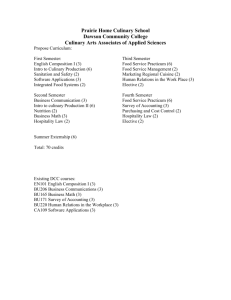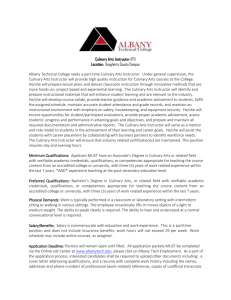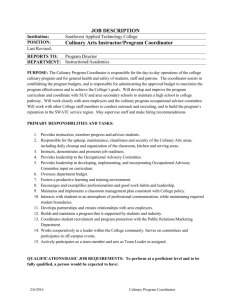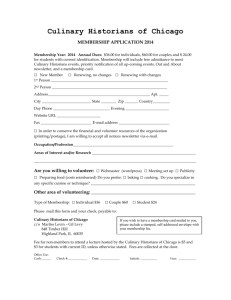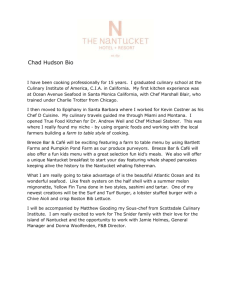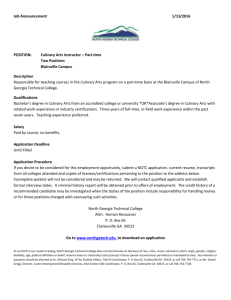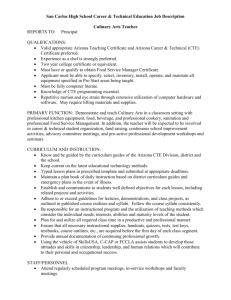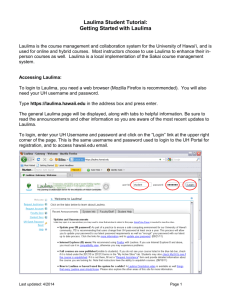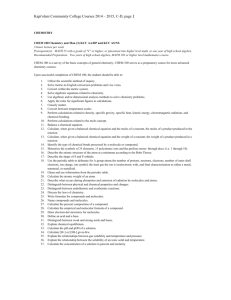CULN 111: Introduction to Culinary Industry
advertisement
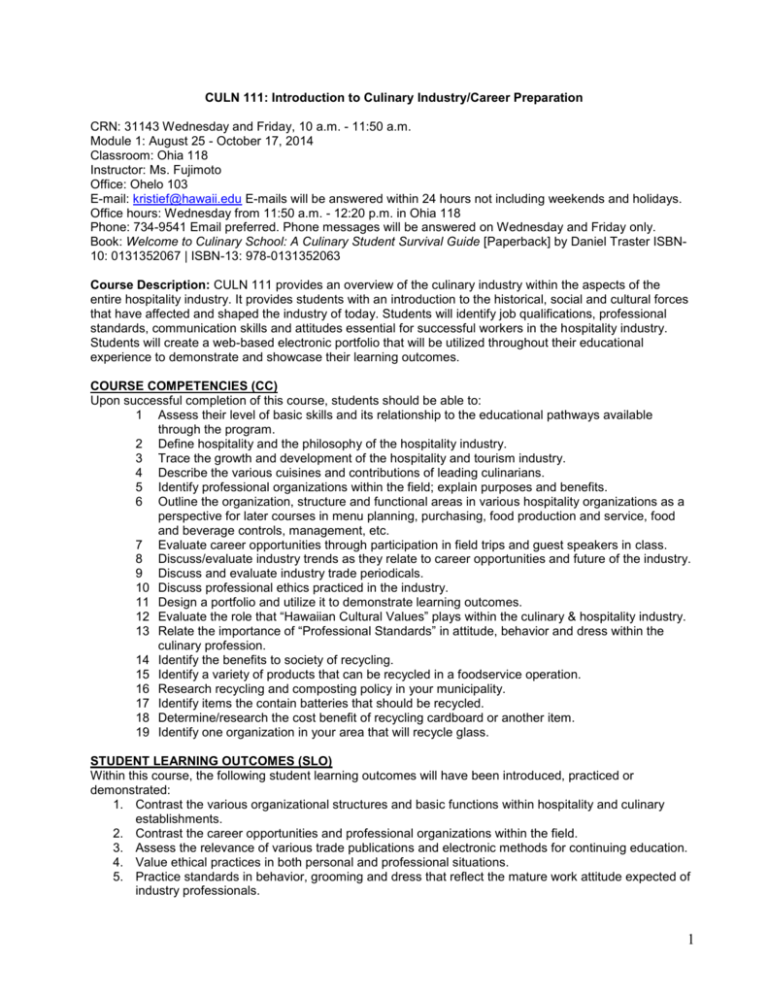
CULN 111: Introduction to Culinary Industry/Career Preparation CRN: 31143 Wednesday and Friday, 10 a.m. - 11:50 a.m. Module 1: August 25 - October 17, 2014 Classroom: Ohia 118 Instructor: Ms. Fujimoto Office: Ohelo 103 E-mail: kristief@hawaii.edu E-mails will be answered within 24 hours not including weekends and holidays. Office hours: Wednesday from 11:50 a.m. - 12:20 p.m. in Ohia 118 Phone: 734-9541 Email preferred. Phone messages will be answered on Wednesday and Friday only. Book: Welcome to Culinary School: A Culinary Student Survival Guide [Paperback] by Daniel Traster ISBN10: 0131352067 | ISBN-13: 978-0131352063 Course Description: CULN 111 provides an overview of the culinary industry within the aspects of the entire hospitality industry. It provides students with an introduction to the historical, social and cultural forces that have affected and shaped the industry of today. Students will identify job qualifications, professional standards, communication skills and attitudes essential for successful workers in the hospitality industry. Students will create a web-based electronic portfolio that will be utilized throughout their educational experience to demonstrate and showcase their learning outcomes. COURSE COMPETENCIES (CC) Upon successful completion of this course, students should be able to: 1 Assess their level of basic skills and its relationship to the educational pathways available through the program. 2 Define hospitality and the philosophy of the hospitality industry. 3 Trace the growth and development of the hospitality and tourism industry. 4 Describe the various cuisines and contributions of leading culinarians. 5 Identify professional organizations within the field; explain purposes and benefits. 6 Outline the organization, structure and functional areas in various hospitality organizations as a perspective for later courses in menu planning, purchasing, food production and service, food and beverage controls, management, etc. 7 Evaluate career opportunities through participation in field trips and guest speakers in class. 8 Discuss/evaluate industry trends as they relate to career opportunities and future of the industry. 9 Discuss and evaluate industry trade periodicals. 10 Discuss professional ethics practiced in the industry. 11 Design a portfolio and utilize it to demonstrate learning outcomes. 12 Evaluate the role that “Hawaiian Cultural Values” plays within the culinary & hospitality industry. 13 Relate the importance of “Professional Standards” in attitude, behavior and dress within the culinary profession. 14 Identify the benefits to society of recycling. 15 Identify a variety of products that can be recycled in a foodservice operation. 16 Research recycling and composting policy in your municipality. 17 Identify items the contain batteries that should be recycled. 18 Determine/research the cost benefit of recycling cardboard or another item. 19 Identify one organization in your area that will recycle glass. STUDENT LEARNING OUTCOMES (SLO) Within this course, the following student learning outcomes will have been introduced, practiced or demonstrated: 1. Contrast the various organizational structures and basic functions within hospitality and culinary establishments. 2. Contrast the career opportunities and professional organizations within the field. 3. Assess the relevance of various trade publications and electronic methods for continuing education. 4. Value ethical practices in both personal and professional situations. 5. Practice standards in behavior, grooming and dress that reflect the mature work attitude expected of industry professionals. 1 STUDENT RESPONSIBILITIES & CLASS PROCEDURES 1) Communication: “The electronic communications policy adopted in December 2005 establishes the University of Hawaii Internet service as an official medium for communication among students, faculty, and staff. Every member of the system has a Hawaii.edu address, and the associated username and password provide access to essential Web announcements and email. You are hereby informed of the need to regularly log in to UH email and Web services for announcements and personal mail. Failing to do so will mean missing critical information from academic and program advisors, instructors, registration, and business office staff, classmates, student’s organizations, and others.” -UH Academic Policy Class lectures, assignments, quizzes and other materials will be posted on Laulima website (Laulima). Instructor will also communicate through Laulima and UH webmail. General class questions should be posted on Laulima. Personal questions should be e-mailed to me. Students should check UH webmail on a daily basis for updates and announcements pertaining to class. Monitor grades using Laulima. Bring discrepancies to the instructor in a timely manner. Communicate with instructor on a regular basis with questions/concern 2) Professionalism: Students are expected to maintain a standard of professionalism in all culinary classes in order to prepare them for industry employment. Professionalism includes on-time arrival, active participation and appropriate behavior, communication, and dress. Students who do not meet standards may be asked to leave class and/or receive an automatic point deduction. Cell phones and other electronics should be turned off or to vibrate during class. Check messages between classes or during break. Violent behavior, including profanity, swearing, physical or verbal abuse, harassment, etc. are forbidden by college and program. Demonstrate respect for your classmates, instructor, and guest speakers. Avoid side conversations, negative attitudes, and gossip. This is a smoke-free campus including electronic cigarettes. Professionalism standards may be found in the Culinary Program Student Handbook. 3) Dress & Grooming: Students are to be presentably dressed: collared shirts, golf shirts are acceptable. No t-shirts or tank tops. Women may wear dresses or blouses/skirts. No mini skirts. Long-pants or jeans are acceptable, no shorts. Must be clean and free of holes. Shoes should be clean. No baseball caps are allowed. Students who do not meet dress standards will receive an automatic point deduction. Dining room and full cook’s uniforms are acceptable. Specific requirements are in the Culinary Program Student Handbook. 4) Academic Dishonesty, Cheating, and Plagiarism: Academic dishonesty cannot be condoned by the Kapi’olani Community College. Dishonesty includes cheating and plagiarism; it is a violation of the Student Conduct Code and may result in expulsion. For more information please refer to “Student Conduct Code,” Kapi’olani Community College General Catalog. Cheating includes but is not limited to giving unauthorized help during an examination, obtaining unauthorized information about an examination before it is administered, using inappropriate sources of information during an examination, altering the record of any grades, altering answers after an examination has been submitted, falsifying any official University of Hawai’i record, and misrepresenting the facts in order to obtain exemptions from course requirements. Plagiarism includes but is not limited to submitting any document, to satisfy an academic requirement, that has been copied in whole or part from another individual’s work without identifying that individual; neglecting to identify as a quotation a documented idea that has not been assimilated into the student’s language and style, or paraphrasing a passage so closely that the reader is misled as to the source; submitting the same written or oral material in more than one course without obtaining authorization from the instructors involved. Disruptive Behavior: Kapi’olani Community College defines disruptive behavior as speech or action that (1) is disrespectful, offensive, and/or threatening; (2) interferes with the learning activities of other students; (3) impedes the delivery of college services; and/or (4) has a negative impact in any learning environment – including department and staff offices, the library, the Computer Center, the Learning Assistance Centers, labs, clinical sites, service-learning sites, etc. Disruptive behavior includes physically or verbally harassing, threatening, or abusing or acting abusively toward an 2 instructor, staff member, or student in any activity authorized by the college. 5) Disability Statement: If you are a student with a documented disability and have not voluntarily disclosed the nature of your disability so that we may coordinate the accommodations you need, you are invited to contact the Disability Support Services Office in `Ilima 107, ph.734-9552, or email kapdss@hawaii.edu for assistance. For students whose primary disability is Deaf or hard of hearing, contact the KCC Deaf Center in Manono 102, ph. 734-9210 (V) or 447-1379 (videophone) ATTENDANCE / PARTICIPATION: Attendance is required for culinary courses. Role will be taken at the start of class. If you are late, be sure to see your instructor to ensure you are recorded as present. Students may leave the class at any time for “bathroom breaks” and “emergencies”. When we have speakers the door will be closed and no one will be allowed to enter until the speaker takes a break or finishes. Students will start with 245 points for participation. Deductions will be made according to the following scale: 5 Point or more deduction for late arrival or early departure depending on the amount of time absent from class. 5 Point deduction for students who do not meet dress standards 1-15 point deduction for unprofessional behavior or lack of participation (i.e., sleeping, inappropriate use of computers, disruptions, cell phone/electronic use during class, etc…) Participation and in-class assignments CANNOT be made up even with excused absences. Students are responsible for keeping track of in-class activities and assignments QUIZZES: Quizzes are taken utilizing the “Tasks, Tests, and Surveys” tab on Laulima. The Quiz will open the day before it is due at 9 a.m. in the morning and close on the due date at 9 a.m. You are responsible for having access to a working computer with internet. Quizzes cannot be made-up unless you have a police report, court notice, or doctor’s note due to your illness or your dependent’s. TAKE HOME ASSIGNMENTS: Follow syllabus and know due dates for assignments and daily class activities. Take-Home Assignments will have 5 points deducted for every class day that they are late and will not be accepted after 3 late days. It is the student’s responsibility to print out and turn in all required assignments and quizzes on the due date specified in the syllabus. Electronic submissions of assignments ARE NOT accepted unless approved by instructor. (NOTE: “My printer broke…” is NOT a valid excuse for late assignments). Essays and reflections should meet the required length and be written according to the following standards: Format for all papers o Print on standard, white 8.5 x 11 – inch paper. o Double-space the text using Times New Roman and 12 pt font. o Set the margins to 1 inches on all sides o Indent the first line of paragraphs one half-inch from the left margin. o Create a header that numbers all pages in the upper right-hand corner, one-half inch from the top and flush with the right margin. o In the upper left-hand corner of the first page, list your name, your instructor's name, the course, and the date. Again, be sure to use double-spaced text. o Double space again and center the title. Do not underline, italicize, or place your title in quotation marks; write the title in Title Case (standard capitalization), not in all capital letters. 3 This is a sample of the first page of a paper. Your last name page number Your first and last name Instructor Kristie Fujimoto CULN 111 Introduction to Culinary Current date Title GRADING: Grades are based on a point distribution scale. It should be noted that a “C” or higher in this course is required for an A.S. Degree or Certificate programs in Culinary Arts. Students can monitor their progress in Laulima. Any grade discrepancies should be brought to the instructor’s attention immediately. Final course grade reports are not mailed to students. Please check MyUH at http://myuh.hawaii.edu to view final grades at the end of the semester not the module. Grading Component Your Points Points Possible Participation & Professionalism 245 Take-Home Quizzes (3 quizzes x 50 pts/quiz) 150 Volunteer/Community Service (5 hours X 10 pts/hr) 50 Volunteer/Community Service Reflection Paper 25 Guest Speakers Reflection Papers (2 X 25 pts) 50 Educational and Career Path Project 135 Professional Portfolio 135 Cuisine Group Presentation 210 TOTAL 1000 Possible Extra Credit Academic Grievance and Responsibility: “In instructional activities, students are responsible for meeting all of the instructor’s attendance and assignment requirements. Failure to do so may affect their final grade. In all college-related activities, including instruction, they must abide by the college’s codes and regulations, refraining from behavior that interferes with the rights and safety of others in the learning environment. Finally, if they decide to file a grievance, they are fully responsible for providing proof that they have been wronged.” -UH Academic PolicyWITHDRAW & REFUND DATES 08/27/2014 Last day to register 08/27/2014 Last day to receive 100% tuition refund 09/04/2014 Last day to receive 50% tuition refund 09/04/2014 Last day to drop (No "W" on transcript) Letter Grade = % A = 90% above B = 80-89% C = 70-79% D = 60-69% F = <60.0% 09/25/2014 Last day to withdraw from class ("W" on transcript) 4 CULINARY ARTS PROGRAM The following are the minimum expectations in regards to both health and physical fitness that will normally be required of our students and of professionals within the industry: Health Requirements You should be in good physical and mental health. If you have a medical condition, you are strongly advised to discuss your concerns with your doctor. All students are required to obtain a tuberculosis test and proof of MMR inoculation prior to acceptance into the college. Students are strongly urged to obtain vaccination against Hepatitis B prior to the practical component of this program. Physical Fitness Commercial culinary operations require that you be in good physical condition, have the ability to move quickly, the ability to bend, the ability to lift at least 30 pounds, and the ability to stand for long periods of time. Good eye-hand coordination and manual dexterity are skills required for the successful completion of this program. Student Responsibilities: In instructional activities, students are responsible for meeting all of the instructor's attendance and assignment requirements. Failure to do so may affect their final grade. In all college-related activities, including instruction, they must abide by the college's codes and regulations, refraining from behavior that interferes with the rights and safety of others in the learning environment. Finally, if they decide to file a grievance, they are fully responsible for providing proof that they have been wronged. WARNING and NOTIFICATION of HAZARDS and RISKS All occupations within the Culinary and Pastry Arts Profession have inherent risks that prospective students should be aware of. The purpose of this Warning of Hazards and Risks is to bring students' (parents') attention to the existence of potential dangers, to aid them in making an informed decision concerning participation in the program, and in signing the Assumption of Risk and Release of Liability Waiver form. Occupational hazards for the field of culinary/pastry arts include, but are not limited to: cuts and abrasions due to handling sharp objects slips and sprains due to wet, slippery or uneven floors strained muscles and backs due to lifting of heavy objects exposure to foods that one may be allergic to exposure to hazardous cleaning chemicals accidental injury in an internship or practicum experience or en route to or from an internship or practicum experience injury or illness that can affect one's personal health or the health of an unborn child scalding and burns that may result in permanent disfigurement, disability or death An injury or illness can impair one's general physical and/or mental health and may hinder one's future ability to earn a living, engage in business, social, or recreational activities, or generally impair one's ability to enjoy life. There may also be risk of injury, illness, or death resulting from causes not specified in the WARNING and NOTIFICATION of HAZARDS and RISKS. In addition to acknowledging hazards and risks, the applicant must take responsibility regarding matters of safety involving self and others. After receiving instruction, students will be expected to demonstrate safety practices. Students must inform appropriate faculty of any relevant personal medical condition that might be hazardous or risky to self or others. A student may be required to submit permission from his/her personal physician to participate in culinary/pastry arts education activities. The student is responsible for obtaining his/her own health insurance. The student must also purchase his/her own liability insurance if one is required by a practicum or internship site. Upon entering Kapi`olani Community College’s Culinary/Pastry Arts program, the student will be required to sign an Assumption of Risk and Release of Liability Waiver. 5 Upon reading this document, please sign the “Assumption of Risk and Release Waiver” and the “Acknowledgement of Compliance to Program Standards”. All participants in a credit laboratory, apprenticeship, practicum or hands-on non-credit class must read all appropriate safety and sanitation rules and precautions as provided for by the instructor(s) and complete the acknowledgement below: ASSUMPTION OF RISK AND RELEASE WAIVER Culinary/Patisserie Laboratory, Apprenticeship, Practicum or Non-credit Hands-on Classes Course and/or Activity: CRN: 31143 Year: 2014 CULN 111, Intro Semester: (circle one) Spring Summer FALL I have read and fully understand the written safety and other rules and precautions that are a part of the requirements for my participation in the above course/activity, as well as those explained to me by my instructor(s) and agree to strictly observe them. I do for myself, my heirs, executors and administrators, accept full responsibility for the indemnity, release, and discharge the University of Hawaii, its officers, agents and employees from any and all claims of action for property damage, and/or personal injury which may result from my failure to abide by these safety rules and precautions, or from any inherent risks in said course or activity. Print Name Signature Emergency Contact Name Number Emergency Contact Phone Co-signature of Parent or Guardian if under 18 years of age All participants in all CULN classes must read the document “Program Standard: Behavior, Grooming and Dress Code” and complete the acknowledgement below: ACKNOWLEDGE OF COMPLIANCE TO PROGRAM STANDARDS For all Culinary/Patisserie Laboratory, Apprenticeship and Practicum classes I acknowledge that I have read the document titled “Program Standard: Behavior, Grooming and Dress Code” and agreed to abide by all of its conditions. I further understand that failure to comply with these conditions may directly affect my ability to participate in a class, therefore adversely affecting my grade and/or academic standing. Signature Date 6
